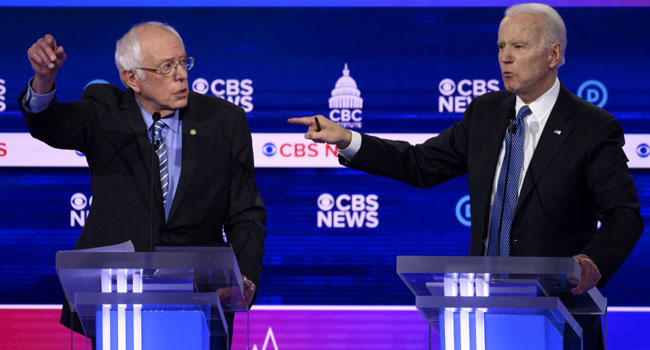
He may be the oldest candidate in the field, but Bernie Sanders is the pick of the Democratic presidential hopefuls among young progressives seduced by fiery anti-establishment rhetoric and vigour belying his 78 years.
The Vermont senator, who hasn’t changed much since his days as a small-town mayor in the 1980s, finds himself catapulted from fringe leftist for much of his career to frontrunner in the race to challenge Donald Trump for the White House.
He is favourite to win the New Hampshire primary on Tuesday after narrowly losing the chaotic first-in-the-nation Iowa vote to fresh-faced challenger Pete Buttigieg.
Victory would put the gruff New York native in good standing to secure the Democratic nomination, although tougher challenges lie ahead as the contest moves to the more diverse electorates of Nevada and South Carolina.
Sanders has struggled to gain acceptance from the Democratic hierarchy — not least because the self-described independent only registered with the party last year.
Written off after defeat against Hillary Clinton in 2016 and dismissed by pundits again in 2020 after a heart attack that paused his campaign, he has re-emerged stronger than ever.
Sanders claimed frontrunner status for the first time with 25 percent support on Monday, reeling in former vice president Joe Biden (17 percent), in a Quinnipiac University national poll.
So what makes the famously irascible senator, a self-described democratic socialist, so popular?
Devotees point, for starters, to his energy. Sanders is a powerful, animated orator and his rallies — attended by thousands — have a rock star feel about them.
With his unruly white hair, he shakes his fist at corporate elites and fires up crowds with talk of “political revolution” and taxing the rich.
Endorsements from rising Democratic star Alexandria Ocasio-Cortez and rapper Cardi B have helped Sanders maintain an aura of vitality singularly lacking, according to critics, in fellow septuagenarian Biden.
Carpenter and filmmaker
Sanders has put the fight against income inequality — which he has called the greatest moral, economic and political issue of our times — at the centre of his campaign.
His zeal and steadfast approach have helped pull the Democrats to the left.
Sanders’ calls for universal health care, a $15 minimum wage and free public university education, were once viewed as unrealistic.
But with Trump taking the Republicans further to the right, several of Sanders’ flagship policies are now championed by Democrat opponents, including Massachusetts Senator Elizabeth Warren.
“We have had more success in ideologically changing the party than I would have dreamed possible. The world has changed,” Sanders told GQ magazine in January 2019, a month before announcing his candidacy.
Sanders, who mounted a bruising challenge to Clinton for the Democratic nomination four years ago, avoids going into great detail about how he will pay for keynote policies such as healthcare for all and free college tuition.
Warren, on the other hand, has at times got too caught up in the minutiae and has struggled to shake off the notion that she is a policy wonk.
Bernard Sanders was born on September 8, 1941, in Brooklyn, New York, into a family of Jewish immigrants from Poland.
He attended Brooklyn College and later the University of Chicago, where he was active in the civil rights movement, attending the 1963 “March on Washington” where Martin Luther King Jr delivered his “I Have a Dream” speech.
After graduating, Sanders worked on an Israeli kibbutz and moved to Vermont, where he worked as a carpenter and filmmaker.
In 1981, he was elected mayor of Burlington, a city of 42,000 people where he met the woman who would become his second wife and closest political advisor — Jane O’Meara.
In 1990 he won election as an independent to the US House of Representatives, serving until 2006 when he was elected to the Senate. He was re-elected in 2012 and 2018.
‘Bernie Bros’
While Sanders’ base appears younger and more diverse than Trump’s, elements have drawn comparisons with the president’s: those that are white and come from blue-collar backgrounds.
Warren and Clinton denounced a toxic streak among Sanders’ more ardent supporters, known as “Bernie Bros,” accused of aggressive and at times sexist online tactics.
Sanders was also forced to deny telling Warren that a woman could never win the White House.
Following his likely success in New Hampshire, Democrats will need to decide where they stand on the broader question of Sanders’ electability.
Some worry that Trump, who routinely mocks Sanders with the nickname “Crazy Bernie,” could successfully portray him as a dangerous communist in an election showdown.
But for supporters, as well as opponents on the Republican side, that outsider quality is exactly why he could appeal to voters.
“Sanders poses the greatest risk because we are still in an anti-establishment era for presidential elections,” summed up the Republican congressman and Trump ally Mark Meadows.
AFP




